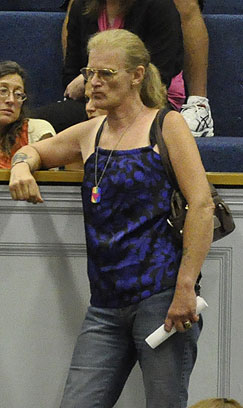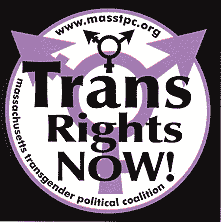 |
 |
Pro-family activism that makes a difference! | ||||
Analysis of "Transgender Rights and Hate Crimes" bill H502 - How it will affect you.Possibly the most radical "transgender" bill ever attemptedPOSTED: June 6, 2011
MassResistance analysis -- 1. Broad legal definition of “gender identity or expression” (Section 11)The bill creates an official legal definition that is extremely broad: “The term ‘gender identity or expression’ shall mean a gender-related identity, appearance, expression, or behavior of an individual, regardless of the individual’s physiology or assigned sex at birth.” (Sec. 11) Thus a man can simply “express himself” or “behave” like a woman to be legally considered a female! And the phrase “regardless of physiology or assigned sex at birth” reads like science fiction. Note that physiology has no reality for these activists. So-called "sex-change" surgeries are no longer the standard for attempting to reclassify one's "gender." Imagine what the words "expression" and "behavior" might allow. All of this opens the door to a Pandora’s box of legal problems. 2. Pushes transgender agenda into public schools and charter schools (Sections 1-5, 8, 9, 10)Homosexual groups have fought for years to force schools to allow boys to dress and act like girls, use girls’ facilities, or for girls to be allowed on boys' athletic teams, etc., if they consider themselves “transgender”. This bill would prohibit all public schools and charter schools from turning away kids on the basis of “gender identity or expression” even if, in the case of public schools, they’re coming in from other districts. Furthermore, the bill updates the statute that created and empowers the state-funded “Commission on Gay and Lesbian Youth” to accommodate the forced inclusion of transgenderism into public schools K-12. It officially renames the Commission to be the “Commission on Gay Lesbian Bisexual and Transgender Youth.” It adds “transgender” and “gender identity or expression” to several sections in the statute. As a result, schools will have no choice but to include programs promoting acceptance, or allow the acting out of transgenderism, cross-dressing, etc., similar to what’s happening in California. 3. Covers all public accommodations – with severe punishment for infractions: (Sections 17, 19)“Public accommodations” encompasses a long list of enterprises, including restaurants, resorts, hotels, bars, theatres, bathhouses, sporting events, stores, health clubs, etc. The bill would prohibit any kind of discrimination whatsoever on the basis of “gender identity or expression” no matter how blatant or offensive to others. In fact, if business owners are breaking the law if they even allow other patrons to incite such discrimination on the premises. This will stifle free speech on this issue in public places. The punishment can be quite severe for the slightest infraction. And in addition to that, the “aggrieved person" can sue for damages. "Gender identity or expression" is thus included with this statutory language: "Whoever makes any distinction, discrimination or restriction . . . relative to the admission of any person to, or his treatment in any place of public accommodation, resort or amusement . . . or whoever aids or incites such distinction, discrimination or restriction, shall be punished by a fine of not more than twenty-five hundred dollars or by imprisonment for not more than one year, or both and shall be liable to any person aggrieved thereby for such damages . . . that such civil forfeiture shall be of an amount not less than three hundred dollars; but such person so aggrieved shall not recover against more than one person by reason of any one act of distinction, discrimination or restriction. . . . This right is recognized and declared to be a civil right." Note the last sentence “This right is recognized and declared to be a civil right.” This “civil right” to “gender identity and expression” will thus reverberate though many other areas of the law. 4. Public restrooms and locker rooms -- including schools, restaurants, businesses, etc. (Section 18)Every woman’s nightmare: The bill specifically states that someone can use the opposite sex rest rooms and locker rooms in any public accommodation if he chooses to “express himself” or “behave” like the opposite sex. (This also includes schools). Men would also begin to see women ("transmen") in their restrooms! (This is already happening at the Massachusetts State House, thanks to Gov. Patrick's recent Executive Order.) Thus, it can legitimately be called a "bathroom bill." "Notwithstanding the provisions of this section or any other special or general law to the contrary, all otherwise lawfully sex-segregated facilities, accommodations, resorts and amusements shall grant persons admission to and the full enjoyment of such facilities, accommodations, resorts and amusements consistent with their gender identity or expression." (Sec. 18) NOTE: The punishment regarding public accommodations mentioned in #3 above for "making a distinction" or interfering with this would apply. 5. Employment, business, labor unions, rentals, real estate, etc. (Section 14)Imagine finding that your day-care provider, second-grade teacher, waiter, school bus driver, store clerk, etc. is blatantly a man with wearing a skirt and lipstick, possibly with hormone-enhanced breasts. Under this bill it would be illegal for any employer (or school principal) to decide for himself whether this is proper, or objectionable, or immoral. You would have no choice: the state will have decided for you. The bill adds “gender identity and expression” to a broad list of definitions of employment that would be illegal to discriminate by. And it includes hiring, firing, compensation, privileges, advertisements for employment, and just about any communication connected with employment. In effect, it forces the inclusion of “transgenderism” into all phases of business and commerce, as well as public schools, universities, and the like. 6. Hate Crimes Laws (Sections 7, 15, 16)Adds “gender identity or expression” to state’s “hate crime” statutes. Gives the state broad powers to fine and imprison people who attempt to interfere with, or attempt to intimidate the free expression of transgenderism. If an assault or battery of a person or damages to real or personal property is committed with the intent determined to intimidate because of “gender identity or expression,” there are stated fines (up to $5000) and/or jail time (2 ½ years). In addition, a conviction requires completion of a “diversity awareness program.” Given the state’s loose definition of assault (which we found out in the Larry Cirignano case, could be merely touching someone) this is quite disturbing. 7. Enforcement by Massachusetts Commission against Discrimination (Sections 6, 12, 13)The Massachusetts Commission against Discrimination (MCAD) is a politically-correct tribunal that enforces (often rather brutally) the state’s anti-discrimination laws on businesses and organizations, and has the authority to impose fines and punishments. The bill gives MCAD legal authority to investigate, subpoena, hold hearings, and pass judgment on alleged discrimination regarding “gender identity or expression.” MCAD is also given the ability to help create rules and regulations affecting all state employers and businesses regarding “gender identity or expression.” The bill instructs MCAD include on its official advisory board “people of adverse gender identities or expression” (imagine trying to recruit for that!) in order to ensure that the transgender laws are strongly enforced. Furthermore, when MCAD creates local “advisory boards” to help in its efforts, these boards must “to the extent reasonably possible” include “people of diverse gender identities and expression.” MCAD is already a nightmare to businesses. Occasionally homosexual activists have staged public “kiss-ins” at Boston restaurants to see the reaction of the management. We’ve seen a bar fined $200,000 by MCAD for throwing out two men kissing, which was disturbing patrons. This will likely encourage men in women’s’ clothes to do the same. MCAD is essentially a shadow court system, but with no right to trial by jury, evidence rules, or right to appeal.
|
| Top |

